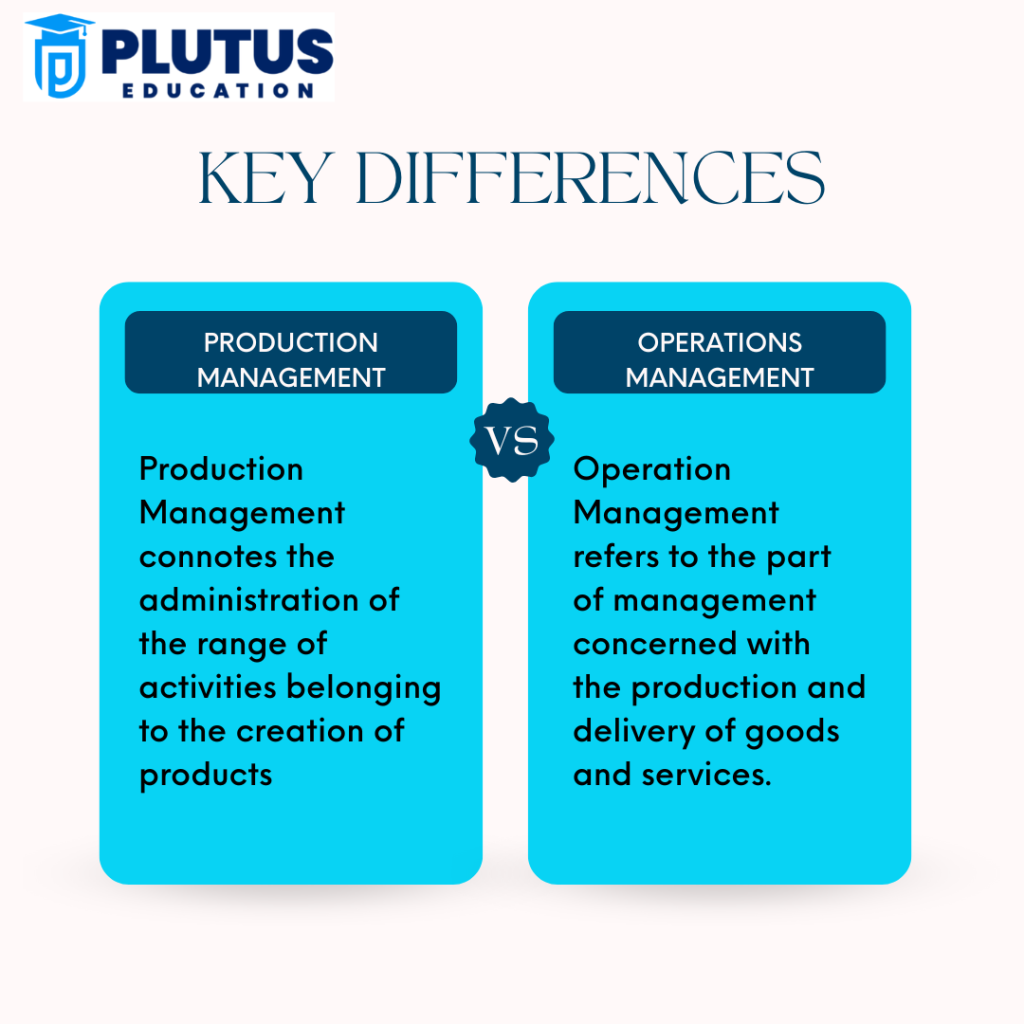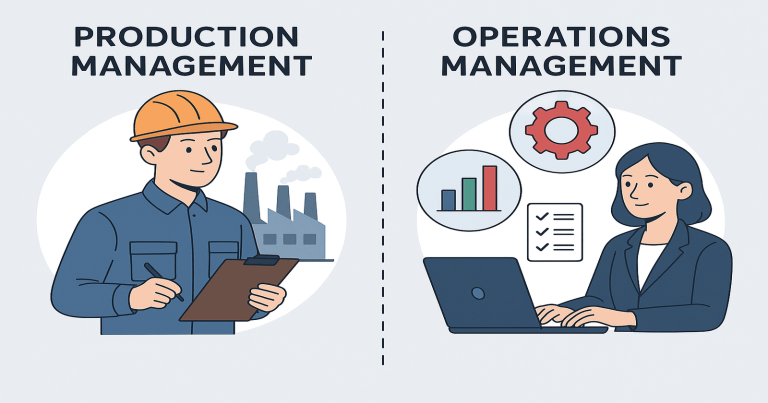In the fast-moving world of business and management, two terms often confuse commerce students and young professionals—production management and operation management. While both sound similar and are closely related, they are not the same. Understanding the difference between these two concepts is important for anyone looking to build a career in business, especially in sectors like manufacturing, services, supply chain, or logistics. Production management deals specifically with the planning, control, and supervision of the manufacturing process. It makes sure raw materials are transformed into finished products in a timely and cost-effective manner.
Contrarily, operation management is a wider function. It takes care of all the processes associated with manufacturing goods and offers services such as planning, organization, and supervision in all departments. Whether a car factory or a hotel for guests, operation management makes sure everything functions well to satisfy customers. Both of these functions are essential for productivity enhancement, cost savings, and quality improvement in today’s competitive landscape.
Meaning of Operation Management
Operation Management refers to the planning, organizing, and controlling of all the processes that convert inputs (like raw materials, labor, and energy) into finished goods or services. It deals with both manufacturing and service-based industries. The main objective of operations management is to make an organization utilize its resources effectively in a way that customer requirements are fulfilled at reduced costs.
Operation management is a central function in today’s competitive environment that drives a company’s success. Decisions range from the location to the layout design, site layout, selection of appropriate equipment, staffing levels, quality assurance, or process improvement. For example, in a hotel, operation management oversees housekeeping, the front desk, food services, and guest relations in such a way that smooth operations are ensured.
It is not limited to factory floors but is a broader concept that applies to restaurants, hospitals, banks, and IT companies. It is the backbone of customer satisfaction, cost efficiency, and timely delivery.
Objectives of Operation Management
The main objective of operation management is to make the organization more effective and efficient. It aims to achieve customer satisfaction while reducing operational costs. Here are its core objectives:
- Maximize Output with Minimum Input: The goal is to increase productivity using the least amount of time, money, and effort. It helps businesses gain more profits with fewer resources.
- Deliver Quality Goods/Services: Operation management ensures that customers get consistent quality in every transaction. Quality standards are maintained at every stage of the process.
- Reduce Operational Costs: It identifies waste and uses tools like Lean, Six Sigma, and Just-In-Time to cut down unnecessary expenses and improve cost efficiency.
- Customer Satisfaction: Providing on-time, accurate, and value-rich goods/services leads to customer loyalty. Satisfied customers bring in repeat business and referrals.
Functions of Operation Management
The key functions that drive operation management are:
- Product/Service Design: This is the design of the offerings that fulfill consumer demand and can be successfully manufactured by the business. Well-designed products or services add to the success of the market.
- Process Planning: It includes a selection of the most effective means and resources to manufacture the output. Top process planning reduces waste, increases the speed of production, and improves effectiveness.
- Inventory Control: Coordinate the movement and storage of raw materials, semi-finished products, and finished products. An effective inventory control system lowers holding and stockout costs.
- Quality Control: There are specifications for every unit or service produced. Inspection, feedback, and corrective actions are all part of this function.
- Logistics&Supply Chain: Operations management plans the movement of products from suppliers to the company and the customers. It guarantees uninterrupted and timely deliveries.
Importance of Operation Management
- Uplifts Customer Service: A well-managed operation means speedier, better, and more reliable service, leading to customer loyalty toward the brand and bringing the brand image up.
- Boosts Profitability: Decreasing waste and increasing efficiency bring about profit for the business without increasing costs.
- Adjusts to Market Changes: It is this way, through operation management, to be flexible and quick to respond to shifts in demand, trends, or crises in the market.
- Kept in Accord with Strategic Objectives: The operations are all aligned, in return, to the long-term goals of the company and buoyed by growth at scale.

Meaning of Production Management
Production Management is a branch of operation management that focuses solely on manufacturing activities. It is concerned with transforming raw materials into finished products using processes like assembly, fabrication, and packaging. Production management is usually associated with industries like automotive, textiles, electronics, FMCG, and pharmaceuticals.
The role of production management is to plan, coordinate, and control the production process to ensure that products are made efficiently, in the right quantity, at the right time, and at the right cost. It includes deciding what to produce, how to produce, when to produce, and how much to produce.
Production managers oversee equipment maintenance, workflow, quality checking, production planning, and material handling. For instance, in a motor vehicle plant, production management oversees the timely delivery of spares, effective assembly line working, and quality checking of completed vehicles.
Objectives of Production Management
Production management has a narrower focus, but its objectives are equally critical to a company’s profitability:
- Resource utilization in minimum loss: From the materials and labor to machines, the end goal is to transform these inputs into maximum outputs with minimum loss. This ensures that every resource has been committed as efficiently as possible.
- Consistent Product Quality: The general expectation from consumers is the same in terms of performance against the product. Such maintenance of quality would enhance trust and reduce the number of returns or complaints.
- Time Management in Production: Adhere to delivery schedules through timely production. This will always avoid penalties, gain customer’s trust, and maintain continuous supply to the chain.
- Waste Reduction: Time well spent on expensive materials and machines reduces scrappage, rework, and idle time. It also supports environmental sustainability goals.
Functions of Production Management
Production management functions revolve around the manufacturing unit. These include:
- Production Planning: Timing and methods of executing a production target, schedule, and goals are all established here. The better the plan, the higher the chances of achieving a hit-by-hit result free of bottlenecks.
- Process Management: All stages of the production process must be managed. These managing processes ensure the appropriate use of resources and the uninterrupted workflow.
- Equipment Maintenance: Machines are safe from surprise breakdowns. Maintenance decreases the probability that equipment’s life would be cut short together with avoiding delays during production.
- Manpower Management: Placing the right men on the right job results in the utilization of skill. This function includes training and shift management.
- Quality Assurance: Makes sure that a buyer is satisfied with the end product. Final inspections, error detection, and feedback loops for improvement are all included.
Importance of Production Management
- Unending Quality of Product: A good production system makes sure that at least one of the qualities on each line is not uniform throughout the product or the single-piece end product, which very often results in customer trust and very few complaints.
- Delivery On Time: A properly organized production schedule will contain all sources of delay and eliminate as many costs as possible to improve the business performance of the supply chain.
- Cost Efficiency: Wise production planning avoids excess inventory, idle machines, and labor costs. All of these combined create considerable savings for business.
- Workflow Balance: Balanced assignment and shift management will often prevent overwork and fatigue as well as misuse of resources and thus create a social advantage in the workplace.
Difference between Production Management and Operation Management
It may be analyzed with comparisons to understand production management and operational management clearly. Both were concerned with efficiency and productivity improvement; however, the two deviate in scope, application, and main duties. For example, production management deals solely with the production of goods; however, operation management concerns itself with much broader activities, which include both goods and services.
| Aspect | Production Management | Operation Management |
| Scope | Limited to manufacturing | Covers manufacturing and services |
| Industry Focus | Only in factories and production units | Applies to all sectors like banking, hotels |
| Objective | Efficient production of goods | Efficient management of business operations |
| Processes Managed | Material handling, machine operation | Inventory, logistics, customer service |
| Resource Type | Tangible resources (machinery, labor) | Both tangible and intangible (technology, people) |
| End Product | Tangible products | Goods and/or services |
| Scope of Control | Shop floor level | Organization-wide |
| Tools Used | Gantt charts, production schedules | ERP systems, process flowcharts |
Production Management vs Operation Management FAQs
Is production management part of operation management?
Yes, production management is a subset of operation management that deals specifically with the manufacturing function.
Can operation management exist without production management?
Yes. In service industries like banking or software, operation management functions independently of production.
Which is broader in scope: production or operation management?
Operation management is broader as it covers both goods and services, while production management is limited to manufacturing.
Who uses operation management?
All industries—whether product-based or service-based—use operation management to improve efficiency and meet customer expectations.
Why is production management important in manufacturing?
It ensures efficient use of resources, reduces costs, maintains product quality, and meets delivery deadlines.
What is the main role of an operations manager?
An operations manager ensures the smooth execution of processes from procurement to delivery in both product and service industries.
What is key difference between the two?
Production management focuses only on goods and factory operations, while operation management oversees all processes, including services.


